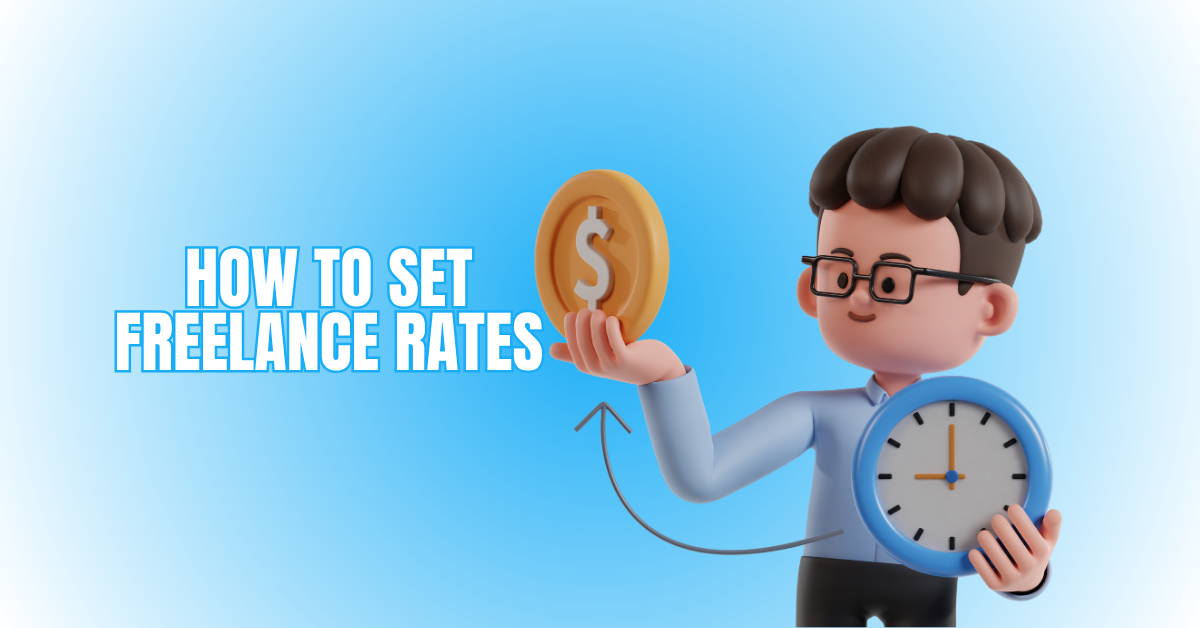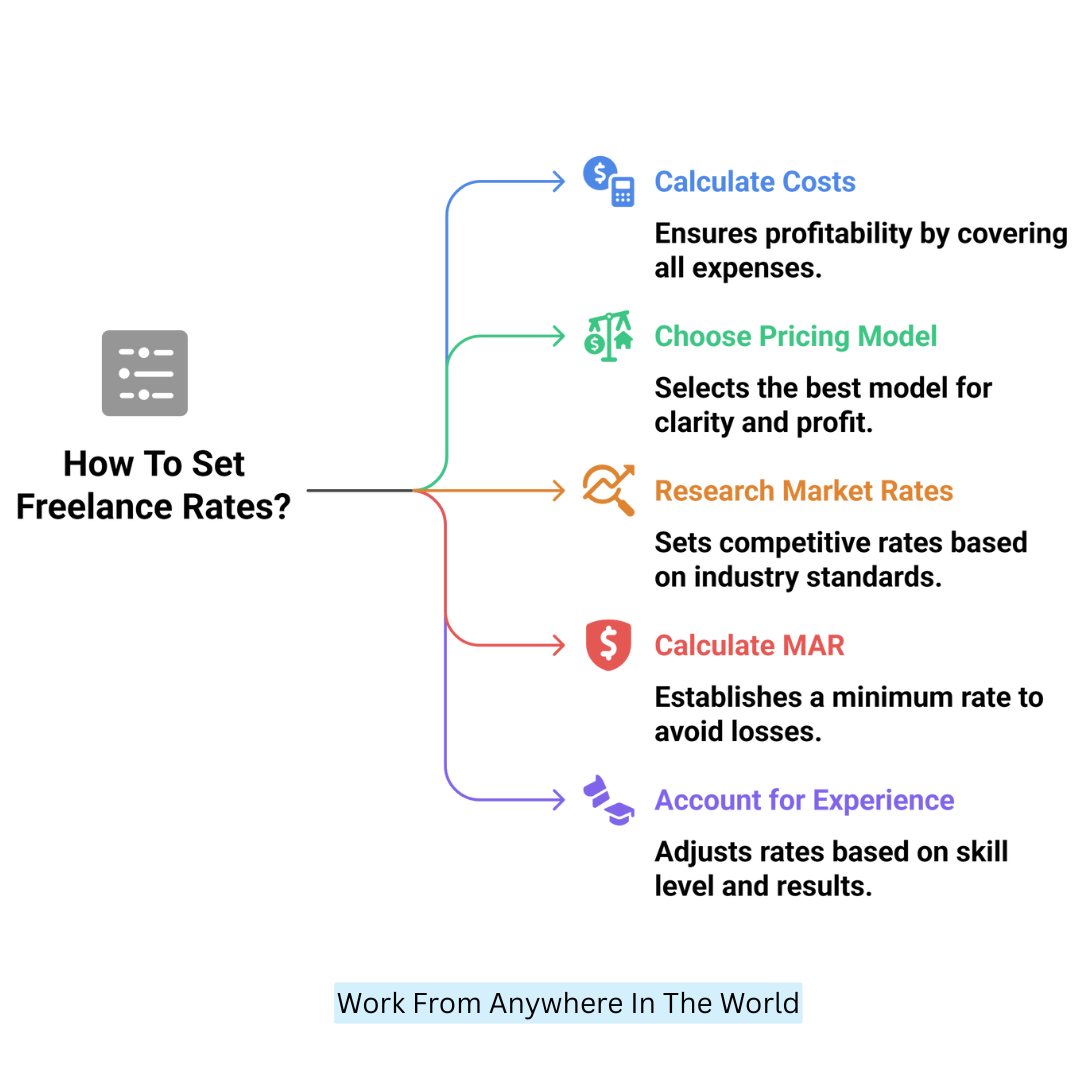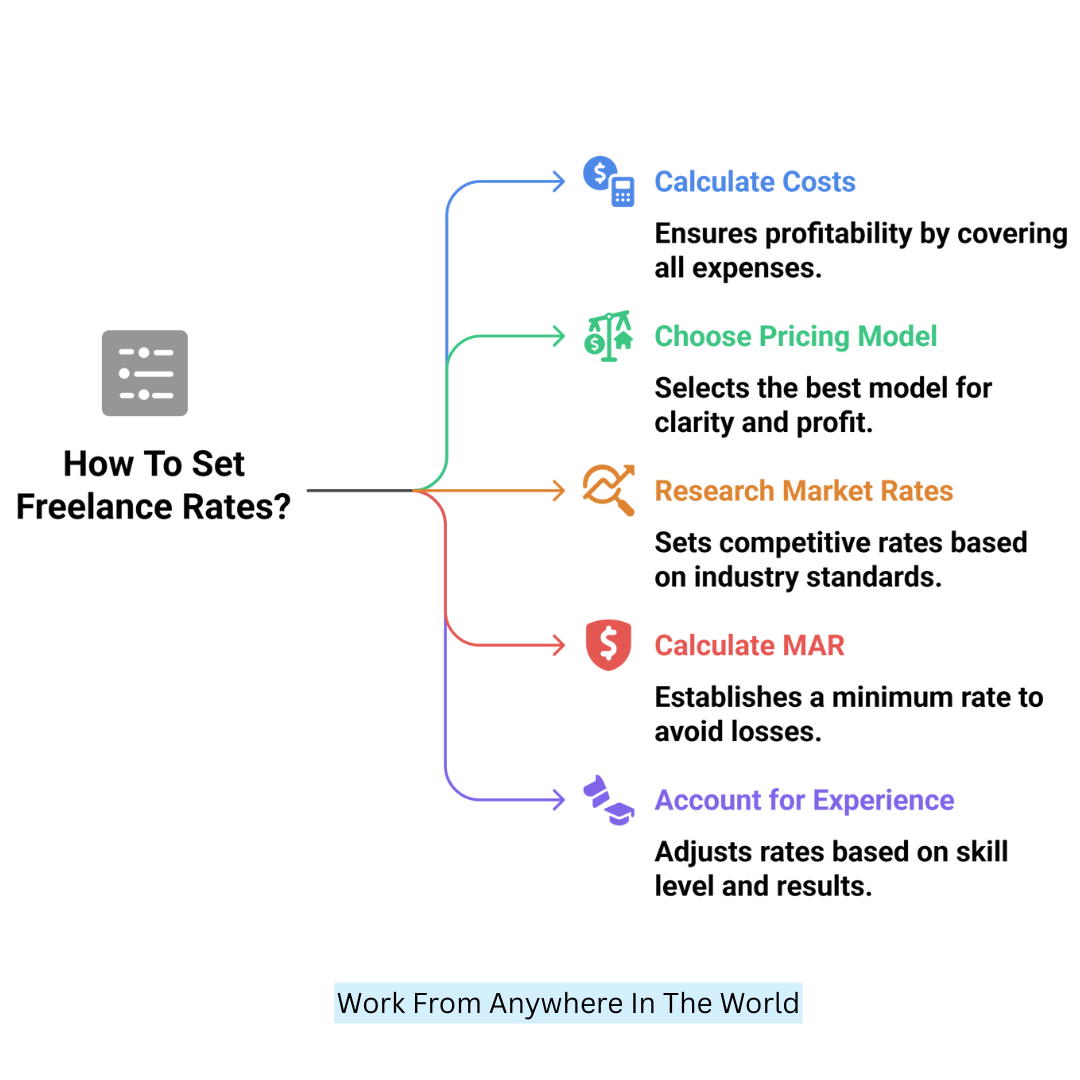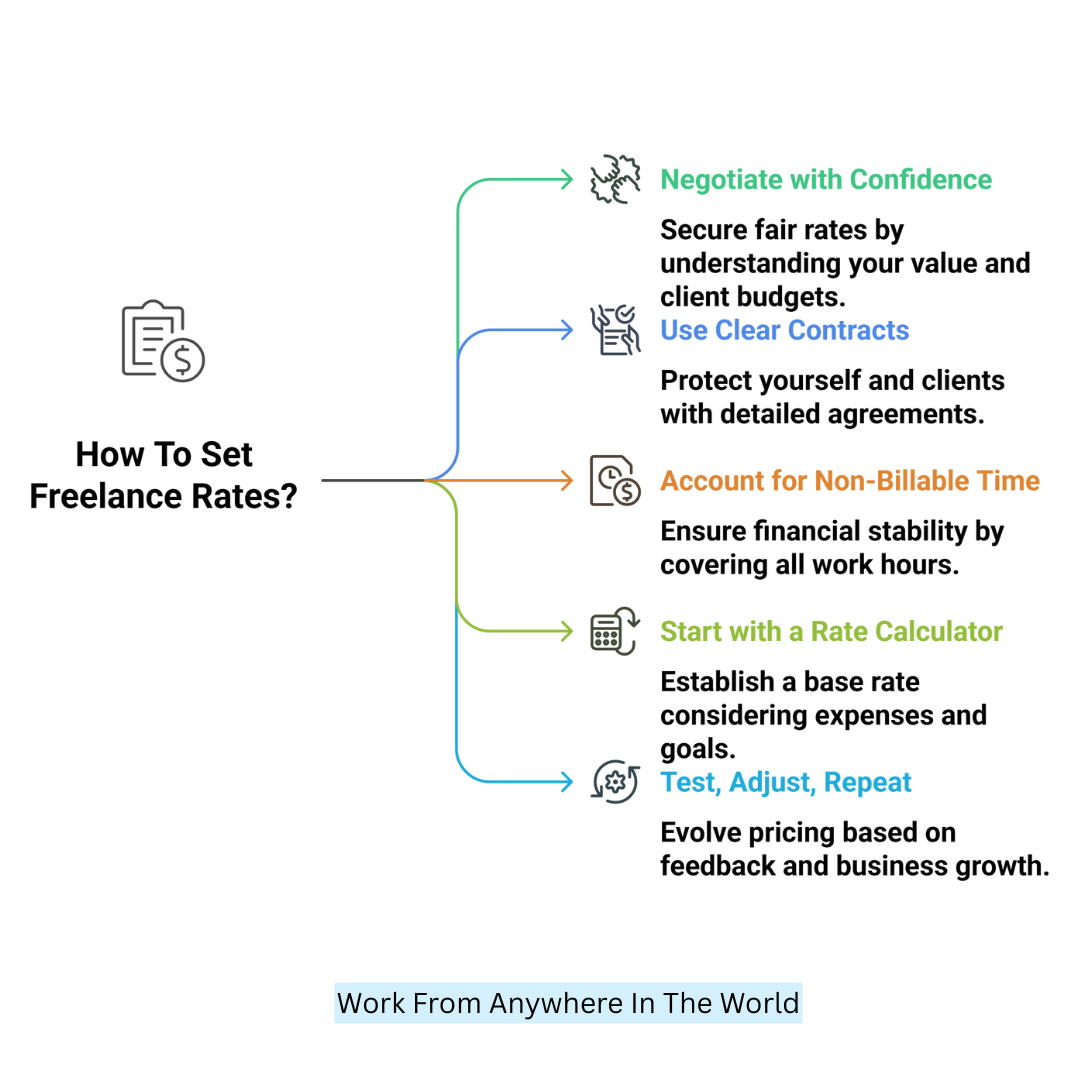How To Set Freelance Rates
How To Set Freelance Rates
Setting freelance rates can feel overwhelming, especially when you're just starting or entering a new niche. But getting it right is crucial for sustaining your business and valuing your time.
In this guide on how to set freelance rates, we’ll break down key factors like expenses, industry standards, and client expectations, so you can price your services confidently and fairly while building a profitable freelance career.

Freelance Rate Setting 101: Charge What You’re Worth
It's important to realize before beginning that determining your freelance rates involves more than just choosing a figure; it also entails appreciating your time, abilities, and experience. Here’s how to break it down step by step and start charging what you’re truly worth.
1. Understand Your Costs Of Doing Business
The first step in setting your freelance rate is calculating your expenses. As a freelancer, you're responsible for everything an employer would typically cover: taxes, health insurance, office supplies, software, and more.
If you're not accounting for these costs, you're not profiting. Make a list of your monthly personal expenses (rent, food, utilities) and business expenses (laptop, tools, subscriptions).
Also consider future savings, vacation time, and downtime. Once you total these, divide them by the number of billable hours you expect to work per month.
This gives you a solid foundation for your minimum hourly or project rate. Remember, this is about sustainability—if you don’t price right, you’ll struggle to make freelancing viable long-term.
Key Points
- Calculate both personal and business expenses.
- Include taxes, insurance, savings, and downtime.
- Divide total expenses by estimated billable hours.
- Set a sustainable base rate to stay profitable.
2. Choose The Right Pricing Model: Hourly, Project, Or Value-Based
Choosing your pricing model is just as important as the rate itself. You can charge hourly, by project, or based on the value you provide. Hourly rates are transparent and straightforward, reasonable for open-ended or support work.
Project rates are ideal for fixed-scope tasks, offering more control over your income. Value-based pricing ties your rate to the ROI you deliver, often yielding the highest profit.
For example, a website that helps a business earn $50K/year could justify a $5K fee, even if it only took 20 hours. Mix models depending on client type and scope.
The key is clarity—your client should understand precisely what they're paying for, and you should ensure it covers your time, energy, and expertise.
Key Points
- Hourly: Best for ongoing or undefined work.
- Project-based: Great for clear, fixed-scope tasks.
- Value-based: Ties pricing to client ROI, often most profitable.
- Use mixed models when suitable.
- Ensure pricing is transparent and justifies your input.
3. Research Market Rates In Your Industry
One of the first steps in learning how to set freelance rates is conducting market research to understand industry standards and competitive pricing.
Look at what others in your field are charging based on experience, geography, and specialization. Use sites like Upwork, Fiverr, and Freelancer to check competitor pricing.
Explore industry surveys (e.g., Freelancers Union or Payoneer reports) for average rates by role and region. Connect with peers in online communities to discuss pricing strategies.
Rates can vary drastically—graphic designers in the U.S. may charge $50/hour, while those in Southeast Asia might charge $20.
But your value isn’t just based on location; it includes results, professionalism, and turnaround time. Use this data to determine a rate range, then align with your personal financial needs and positioning in the market.
Key Points
- Research competitors’ rates by role, skill, and location.
- Use freelance platforms and industry surveys for benchmarks.
- Join online groups to discuss rate trends and tips.
- Consider your value beyond location—skills, results, and service quality.
- Set a range, then align it with your financial goals.
4. Calculate Your Minimum Acceptable Rate (MAR)
Your Minimum Acceptable Rate (MAR) ensures you're not working at a loss. To calculate it, add up your total monthly living expenses, business costs, taxes, and savings. Then divide by the number of billable hours you can realistically work each month (usually 60–80 for many freelancers).
For instance, if your total monthly costs are $4,800 and you can bill 80 hours monthly, your MAR is $60/hour. Anything less means you’re not covering your expenses.
Keep in mind, billable hours are only a fraction of your total working time, as you’ll also spend time on admin, marketing, and client calls. Revisit your MAR every 6–12 months to adjust for growth, inflation, or lifestyle changes.
Key Points
- Add up all monthly living, business, and savings expenses.
- Divide by expected billable hours to get your MAR.
- MAR ensures you cover all costs, even with non-billable tasks.
- Recalculate every 6–12 months to reflect changes.
- Never accept work below your MAR.
5. Account For Your Experience And Skill Level
Understanding how to set freelance rates starts with evaluating your experience, skills, and niche expertise to determine your actual market value. If you're a beginner, you might start at $20–$40/hour.
Intermediate freelancers typically earn $50–$100/hour, while experts charge $100–$250/hour or more. If you’ve built a portfolio that demonstrates results—such as increased traffic, conversions, or client revenue—you can charge a premium.
Certifications and industry awards also justify higher rates. Niching down adds more value; a UX designer focused on fintech apps can charge more than a generalist.
Your rate should evolve with your experience. As you gain confidence and deliver stronger outcomes, don’t hesitate to raise your prices. Clients pay for the benefit of your skills, not just your time.
Key Points
- Charge based on your experience level and portfolio results.
- Specialized skills and niches allow higher pricing.
- Use certifications and awards to justify rate increases.
- Beginners: $20–$40/hr; Intermediates: $50–$100/hr; Experts: $100+
- Re-evaluate and raise rates as your value grows.

6. Consider Client Type And Their Budget
Your rate may fluctuate depending on the type of client you work with. Startups may have tight budgets but offer creative freedom or long-term potential.
Large corporations usually have bigger budgets, but more bureaucracy and higher expectations. Nonprofits often value mission alignment over top-tier pricing.
Agencies may provide recurring work at slightly lower rates in exchange for volume. Always ask for a budget during your discovery call. Tailor your offerings based on the client type.
For example, a corporate client may need full-service support, justifying a premium rate, while a startup might prefer a basic package. Understanding the client’s goals and budget early on helps you price accordingly without surprises.
Key Points
- Client type affects budget, expectations, and workflow.
- Startups = flexibility, lower budgets; Corporations = higher pay, more red tape.
- Nonprofits often value mission fit over pricing.
- Agencies may offer steady work, but at lower rates.
- Ask about the budget early to align your pricing and offer.
7. Offer Tiered Pricing Or Service Packages
One innovative approach to setting freelance rates is by offering tiered pricing packages that provide clear value and upsell opportunities for clients. Create three package options—basic, standard, and premium—each with increasing deliverables and prices.
For example, a copywriter might offer one blog post with minimal SEO for $300 (basic), two SEO-optimized posts with keyword research for $600 (standard), and a complete content strategy with three posts for $1,200 (premium).
Customers can choose what best meets their needs and are given a clear sense of value as a result. Packages also simplify your workflow by setting boundaries around revisions and deliverables.
They're especially helpful in avoiding scope creep, as each tier outlines what’s included. Plus, you can scale faster by selling predefined services instead of custom quoting every time.
Key Points
- Create basic, standard, and premium service tiers.
- Tiered options increase perceived value and upsell potential.
- Helps clients choose based on budget and need.
- Prevents scope creep by clearly defining deliverables.
- Speeds up quoting and streamlines your service process.
8. Focus On Value, Not Just Time
Clients don’t just pay for your hours—they pay for results. Instead of charging by the hour, emphasize the outcomes of your work. A web designer doesn’t just create a site—they help businesses attract leads and convert customers.
A marketing consultant doesn’t just make ads—they increase ROI. Communicate your value in terms of client benefits. Use phrases like “This package is designed to boost your visibility and grow revenue” instead of “It’ll take 10 hours to complete.”
Value-based pricing can significantly increase your income and position you as a strategic partner, not just a service provider. When clients see the return on their investment, they’re more likely to pay premium rates and work with you long-term.
Key Points
- Emphasize outcomes, not hours worked.
- Communicate how your work benefits the client’s bottom line.
- Use value-based pricing for higher earnings.
- Position yourself as a partner, not just a task-doer.
- ROI-driven results justify premium rates.
9. Raise Your Rates As You Grow
Part of learning how to set freelance rates is regularly reviewing and increasing them to reflect your growing skills, experience, and market demand.
Many freelancers underprice themselves for too long out of fear of losing clients. But staying stagnant is a path to burnout.
Plan to evaluate your rates every 6 to 12 months. If you’ve completed several successful projects, gained new certifications, or built a strong client list, it’s time to raise rates.
Notify clients 30 days in advance, and frame it as an adjustment to reflect the quality and demand for your services. Loyal clients may remain even with a slight increase.
You can also “grandfather” select clients at current rates for a set period. Be confident—rate increases are a natural part of business growth.
Key Points
- Reassess your rates every 6–12 months.
- Raise prices with growth in skill, results, or demand.
- Inform clients in advance—30 days is ideal.
- Offer “grandfathered” rates to loyal clients.
- Don’t fear rate hikes—they reflect your value.
10. Learn To Say No To Low-Budget Work
Knowing how to set freelance rates also means recognizing when to say no to low-budget clients who undervalue your time and expertise.
It’s tempting to accept every offer when starting, but as you build your brand, you must be selective. Politely decline projects that don’t meet your rate or require unrealistic deliverables.
Say something like, “Thanks for considering me, but my project minimum is $X.” It’s okay to walk away—saying no creates space for better clients.
You can also refer them to a junior freelancer or suggest a scaled-down version of your service. Remember, your time is valuable. Working with respectful, well-paying clients leads to better results and greater job satisfaction.
Key Points
- Low-budget work often leads to burnout and wasted time.
- Declining bad-fit projects protects your energy and focus.
- Set a clear minimum rate and stick to it.
- Refer small-budget clients elsewhere if possible.
- Saying no makes room for better opportunities.

11. Negotiate With Confidence And Clarity
Mastering how to set freelance rates includes developing strong negotiation skills to communicate your value and avoid underselling yourself confidently.
Start by asking clients about their budget before offering a price. Then, frame your services in terms of value, not just deliverables.
For example, say, “This package typically costs $1,000 based on the results I’ve delivered for similar clients.” Be ready with alternatives if they balk—offer a stripped-down version rather than lowering your rate.
Stay calm, professional, and willing to walk away if the fit isn’t right. Having backup plans and understanding your value are the foundations of confidence. Over time, you’ll get better at spotting good clients and negotiating fair rates that support your growth.
Key Points
- Ask about the client's budget before quoting.
- Emphasize results and ROI, not just tasks.
- Offer smaller packages instead of lowering your rate.
- Stay professional and ready to walk away if needed.
- Confidence grows with experience and backup clients.
12. Use Clear Contracts To Define Scope And Pricing
Part of learning how to set freelance rates is protecting your pricing and terms with a clear, written contract that outlines expectations and safeguards payment.
Specify your rate (hourly or project-based), when you expect payment, and any late fees. Include what happens if the client changes the scope or delays the process.
Use tools like Bonsai, Dubsado, or HelloSign to create professional, easy-to-understand contracts. A well-drafted agreement builds trust and avoids misunderstandings later.
If a client hesitates to sign a contract, consider that a red flag. Formalizing every deal ensures you’re legally covered and sets professional expectations from the start. Contracts aren't optional—they're essential to getting paid fairly and on time.
Key Points
- Always use a written contract for every project.
- Define scope, rate, timeline, and payment terms.
- Include clauses for revisions, delays, and cancellations.
- Use tools like Bonsai or HelloSign for ease.
- A signed contract sets professional expectations and protects you legally.
13. Account For Non-Billable Time
Many freelancers mistakenly assume they’ll be billing a full 40-hour workweek. In reality, only a portion of that time is billable.
Tasks such as responding to emails, administrative work, creating proposals, networking, marketing, invoicing, and client meetings don’t directly generate income, but they’re all essential to running a successful business. You might only get 15–25 billable hours out of a typical 40-hour week.
That means your rate must be high enough to cover all your non-billable work. For instance, if your monthly income goal is $5,000 and you can realistically bill 80 hours per month, you’ll need to charge at least $62.50/hour. Always factor this reality into your rate—otherwise, you’ll fall short of your financial needs.
Key Points
- Only a fraction of your time is billable.
- Tasks like admin, calls, and proposals take time, too.
- Calculate your rate to cover both billable and non-billable work.
- Use realistic time estimates to avoid undercharging.
- Don’t forget: your actual workload is more than just client tasks.
14. Start With A Rate Calculator
If you’re not sure where to begin with pricing, freelance rate calculators can be beneficial. These tools take your personal and business expenses, work hours, and income goals into account to suggest a starting hourly or project rate.
Some trusted calculators include the Freelance Rate Calculator by Bonsai, Rate Explorer by Freelancers Union, and YourRate.co.
These tools also help you factor in things like vacation time, taxes, and retirement savings—critical elements that are often overlooked.
While the numbers these tools provide aren’t set in stone, they give you a strong foundation for informed decision-making. Once you get your base rate, you can tweak it according to your experience level, industry, and target clientele.
Key Points
- Use tools to calculate a smart starting rate.
- Include living expenses, taxes, and savings goals.
- Try Bonsai, YourRate.co, or Freelancers Union tools.
- Treat the result as a guide, not a final answer.
- Adjust your rate based on industry, niche, and client type.
15. Test, Adjust, Repeat
An essential part of understanding how to set freelance rates is treating pricing as a flexible strategy that evolves with your experience and business growth.
Start by setting an initial rate that reflects your experience and financial goals. Monitor how prospects respond: Are they accepting your proposals readily, or pushing back on price?
Are you meeting your income goals without overworking? Collect feedback, track which price points yield the best clients, and adjust accordingly.
Every few months, assess your workload, client satisfaction, and personal finances. If you're consistently booked out or improving your skills, consider raising your rates.
Think of pricing as a living part of your freelance business—one that gets refined through data, confidence, and experience.
Key Points
- Start with an informed initial rate.
- Observe client reactions and project outcomes.
- Reevaluate every few months based on demand and skill growth.
- Raise rates when you're booked out or adding more value.
- Pricing is a dynamic, evolving part of your freelance business.

Conclusion
Setting the correct freelance rates is a balance of understanding your value, market demand, and personal goals. By applying these strategies on how to set freelance rates, you’ll create a pricing structure that supports your growth and rewards your skills.
Remember, your rates can evolve as you gain experience and confidence—always keep your worth in mind, and never undervalue the unique expertise you bring to every project.
I trust you enjoyed this article about How To Set Freelance Rates. Please stay tuned for more articles. Take care!
JeannetteZ
Want to Learn How to Build Your Own Home-Based Online Business And Start Making Money Online From Your Comfortable Couch?
Try Wealthy Affiliate!
Your Opinion Is Important To Me
Do you have thoughts, ideas, or questions? I would love to hear from you. Please share your questions, experiences, remarks, and suggestions about How To Set Freelance Rates in the comments below. You can also email me at Jeannette@WorkFromAnywhereInTheWorld.com.
Disclosure
This post may contain affiliate links. I earn from qualifying purchases as an Amazon Associate and through other affiliate programs. Please read my full affiliate disclosure.
You may also enjoy the following articles:
Wealthy Affiliate Coupons For Premium Memberships
Wealthy Affiliate Review – Scam or Legit? The Truth Exposed
An Insider Wealthy Affiliate Review
How To Be Successful In Business Life
Best Tips To Motivate Yourself







